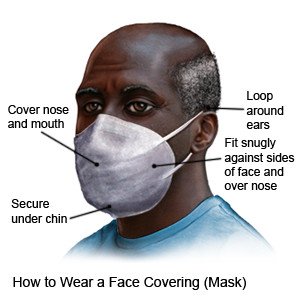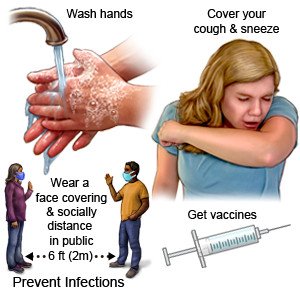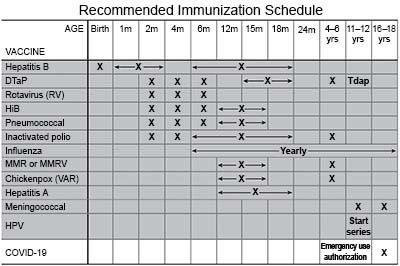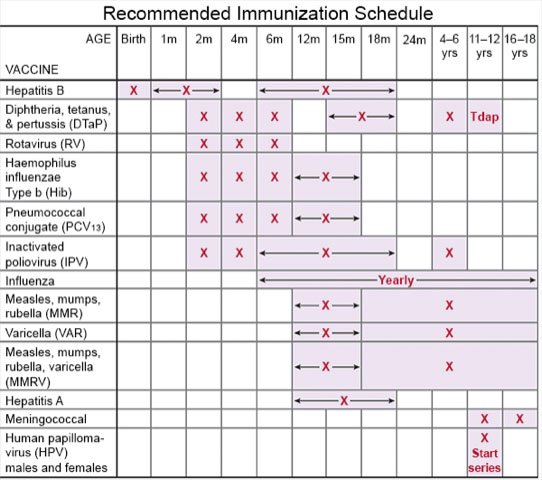Safely Care for Someone Who Has Covid-19
Medically reviewed by Drugs.com. Last updated on Sep 23, 2025.
What do I need to know about how to care for someone who has COVID-19?
A person who has COVID-19 may be able to pass the virus to others during and after recovery. The virus can be passed starting 2 to 3 days before symptoms begin or before a positive test if symptoms never begin. The virus is mainly spread in droplets that form when a person talks, sings, coughs, or sneezes. The droplets can also float in the air or land on surfaces and objects. Follow directions from healthcare providers so you safely care for a person who is recovering from COVID-19 at home.
How can I safely care for the person?
If the person lives in another home, arrange for a time to give care. Remember to bring a few pairs of disposable gloves and a face covering. The person's healthcare provider may give you specific instructions to follow. The following are general guidelines:
- Wash your hands often. Wash before and after you go into the person's home, area, or room. Use soap and running water as often as possible. Rub your soapy hands together for at least 20 seconds before you rinse. Dry your hands with a clean towel or a paper towel. Do not share towels with the person. Use hand sanitizer that contains alcohol if soap and water are not available. Remind the person to wash his or her hands or use hand sanitizer often.

- Put on a face covering (mask) and make sure the person is also wearing one before you go in. Use a cloth covering with at least 2 layers. You can also create layers by wearing a cloth covering over a disposable non-medical mask. Cover your mouth and your nose.

- Help the person so he or she does not expose others to the virus. You will also help the person rest by doing housework, cooking meals, and running errands for him or her. Take care of the person's pets. Some animals, including pets, have been infected with the virus. Make sure the person drinks extra liquids and eats healthy foods. Keep his or her healthcare provider's contact information where you can easily find it. Contact the provider if you notice a symptom is getting worse. The provider will tell you what to do.
- Do not allow others to go near the person. Unless the person lives alone, it is best for him or her to stay in a separate room or area of the home. The person should have his or her own dishes and eating utensils. Keep the room's door shut unless you need to go in or out.
- Make sure the person's room has good air flow. You may be able to open the window if the weather allows. An air conditioner can also be turned on to help air move.
- Wear gloves and a face covering while you give care and clean. Clean high-touch surfaces and objects often.
What else can I do to protect myself?
 |
- Follow your healthcare provider's instructions. You will need to quarantine while you are caring for the person. You should also be tested, even if you do not develop symptoms of COVID-19. Your provider will give you instructions for quarantining and testing.
- Cover sneezes and coughs. Turn your face away and cover your mouth and nose with a tissue. Throw the tissue away. Use the bend of your arm if a tissue is not available. Then wash your hands with soap and water or use hand sanitizer. Teach children how to cover a cough or sneeze.
- Get a COVID-19 vaccine as directed. At least 1 dose of an updated vaccine is recommended for everyone 6 months or older. COVID-19 vaccines are given as a shot in 1 to 3 doses, depending on the age of the person who receives it. COVID-19 vaccines are updated throughout the year. Your healthcare provider can help you schedule all needed doses as updated vaccines become available.

- Follow directions after you receive a COVID-19 vaccine. You can become infected even after you get the vaccine. You may also be able to pass the virus to others without knowing you are infected. Check local, national, and international travel rules. Some countries require proof of a negative test before you travel. You may also need to quarantine after you return.
- Try to keep space between you and others when you are out of the house. Avoid crowds as much as possible. Wear a face covering when you must be around a large group and cannot keep space from others.
- Clean and disinfect high-touch surfaces and objects in your home often. Use disinfecting wipes, or make a solution of 4 teaspoons of bleach in 1 quart (4 cups) of water.
- Get other recommended vaccines as needed. Get the influenza (flu) vaccine as soon as recommended each year, usually starting in September or October. Get the pneumonia and respiratory syncytial virus (RSV) vaccines, if recommended. Your healthcare provider can tell you if you also need other vaccines, and when to get them.

Where can I find more information?
- Centers for Disease Control and Prevention
1600 Clifton Road
Atlanta , GA 30333
Phone: 1- 800 - 232-4636
Web Address: http://www.cdc.gov
Call your local emergency number (911 in the US) if:
- The person has trouble breathing or shortness of breath at rest.
- The person has chest pain or pressure that lasts longer than 5 minutes.
- The person becomes confused or hard to wake.
When should I seek immediate care?
- The person has trouble staying awake during the day.
- The person's nail beds, face, fingers, or toes look blue or darker than usual.
When should I call the person's doctor?
- The person has a fever.
- The person has any new or worsening symptoms.
- You develop any signs or symptoms of COVID-19 while you are caring for the person.
- You think you or someone in your home has become infected.
- You have any questions or concerns.
Care Agreement
You have the right to help plan your care. Learn about your health condition and how it may be treated. Discuss treatment options with your healthcare providers to decide what care you want to receive. You always have the right to refuse treatment. The above information is an educational aid only. It is not intended as medical advice for individual conditions or treatments. Talk to your doctor, nurse or pharmacist before following any medical regimen to see if it is safe and effective for you.© Copyright Merative 2025 Information is for End User's use only and may not be sold, redistributed or otherwise used for commercial purposes.
Further information
Always consult your healthcare provider to ensure the information displayed on this page applies to your personal circumstances.
